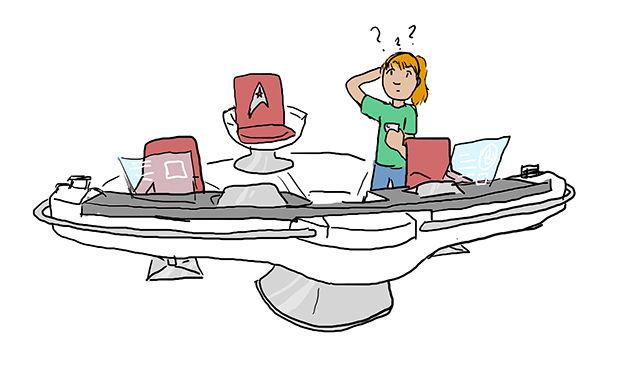ontinuing a 50-year legacy, CBS announced it will launch a new Star Trek television series beginning in January 2017.
The famous science fiction television series has had multiple shows in its time after “Star Trek: The Original Series” which launched in 1966. Long before the show’s 22nd-century setting, several technologies presented as science fiction in “Star Trek’s” universe have appeared in modern-day culture.
Rich Cooper, English professor, said science fiction can often influence the development of technologies in a roundabout way.
“It’s not so much about predicting, it’s about influencing the direction of thoughts and ideas of the people that are engaged in these enterprises and doing these things,” Cooper said. “And sometimes you strike a chord.”
Cooper said the 1984 book “Neuromancer” is a perfect example of science fiction influencing the development of technology. “Neuromancer,” which centers around a hacker in a dystopian society, may have influenced the minds that lead to the early stages of the Internet, said Cooper.
“I also wonder how much of it is the self-fulfilling prophecy, because I think ‘Neuromancer’ is the perfect example of the self-fulfilling prophecy,” Cooper said. “The people who read science fiction, they were nerds and tech-heads and they read it and said,‘We’re going to make something like that.’ It’s not really so much that he predicted it, it’s more that he so influenced this particular subset of culture that his influence became their ideas and pushed their ideas.”
Kari Rives, president of the Science Fiction Association, said science fiction has the biggest impact when people get excited about ideas presented in the genre.
“If it is something that people who are going into the industrial fields won’t ever read, it probably won’t have an impact,” Rives said. “Because in order to have new technologies you have to have engineers behind it that want to find a way — they can convince their management that it is possible. And so if you can’t get people excited there is really no way for it to have an impact.”
Technology has certainly changed in the half-century since “Star Trek” was originally released. Some of the devices first presented in the show that wowed fans throughout the decades have creeped into reality.
In the original series, nearly every crewmember had a “communicator.” Beyond acting as a simple radio, the device allowed the crewmembers to speak securely to another crewmember over great distances, often from planetside to the Enterprise in orbit.
A few short years later in 1973, Martin Cooper is regarded to have made the first mobile telephone call using a prototype mobile phone. While it would take another decade for mobile phones to become commercially available, today you would be hard pressed to find someone without a cell phone.
Likewise, while certainly not a new concept, “Star Trek” contained a plethora of robots and artificial intelligence of all shapes and varieties. In “The Next Generation,” an android by the name of Data would join the crew. In the original series, the Enterprise had a computer on board that assisted with calculations and analysis from time to time. In one particularly tense episode it was replaced with a revolutionary tactical and control computer, M-5.
Advances in robotics and computers over the past 50 years are nothing short of astounding. IBM’s Watson seems to be one of humanity’s first steps in building a real AI. Watson won 1st place in “Jeopardy!” In 2011 and in 2013 Watson began assisting nurses with decisions for lung cancer treatments. Attempts to continue the development of self-learning AIs continue across the globe.
Cooper said he is excited to see what comes of the revival of the series.
“It’s good to know if we are reviving ‘Star Trek’ that we haven’t lost that sense of hope about the future, and that might be the most powerful thing about it,” Cooper said. “It sort of keeps us hoping and moving toward this better future, but again we aren’t going to get there alone, we are only going to get there through technology.”
Josh Hopkins is a history and political science junior and a science and technology reporter for The Battalion.
Finding the science in science fiction
November 17, 2015
0
Donate to The Battalion
$1815
$5000
Contributed
Our Goal
Your donation will support the student journalists of Texas A&M University - College Station. Your contribution will allow us to purchase equipment and cover our annual website hosting costs, in addition to paying freelance staffers for their work, travel costs for coverage and more!










